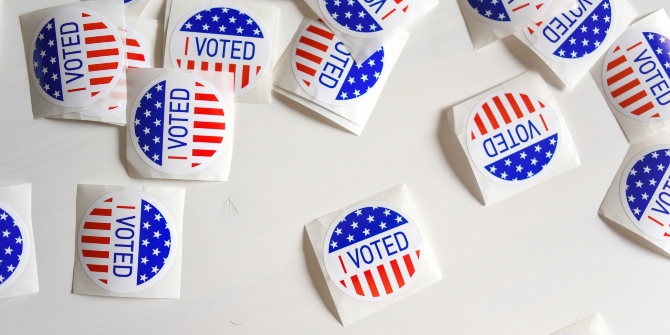 Elections for state and local offices were held this week across the US. Democrats and progressive causes performed well, including in Virginia, Ohio, and Kentucky. However, as Thomas Gift writes, these wins come in the face of poor polling for President Joe Biden one year out from the 2024 election. They could ultimately prove pyrrhic victories for the White House unless Biden can shake up the narrative around his campaign.
Elections for state and local offices were held this week across the US. Democrats and progressive causes performed well, including in Virginia, Ohio, and Kentucky. However, as Thomas Gift writes, these wins come in the face of poor polling for President Joe Biden one year out from the 2024 election. They could ultimately prove pyrrhic victories for the White House unless Biden can shake up the narrative around his campaign.
Why do you think Democrats outperformed expectations in the elections?
I think two things really helped Democrats: first, Republicans’ embrace of the “crazy,” and second, the abortion issue, which clearly still has legs for progressives. Both propelled Democrats in the 2022 midterms, and we essentially saw a redux of that story this week. On the “crazy” point, moderate voters clearly aren’t enamored with ultra-MAGA politics. Since Trump came onto the scene, Republicans have consistently failed to put wins on the board, and the recent debacle over the House speakership only added to a sense of bedlam. Their losing streak speaks for itself: Republicans got creamed in the 2018 midterms, Trump lost in 2020, then the party failed to pull off a (supposedly certain) “red wave” last year. You can add Tuesday’s results to that heap of (avoidable) losses. On the abortion point, Democrats have been hugely successful at mobilizing post-Dobbs outrage to their electoral advantage. Republicans are at a loss on where to go. In Virginia, for example, GOP Governor Glenn Youngkin adopted a (relatively speaking, compared to that of some conservative leaders) moderate stance of banning abortions at 15 weeks, with a number of exceptions. Many other Republicans in the state followed his lead. Yet that obviously still didn’t placate lots of suburban women.
Tuesday seemed particularly bad for Virginia Governor Glenn Youngkin, even though his name wasn’t on the ballot. Do you read it that way?
The Virginia results were striking, and certainly a blow to Youngkin’s reputation as a GOP “golden boy” who could embrace Trumpism, while keeping Trump at arm’s length. In recent weeks, Youngkin and his Spirit of America PAC had really gone “all in” supporting Republican candidates up and down the ballot. For Democrats to flip the state House of Delegates and keep power in the state Senate was a blow to Youngkin personally. Still, I’m not sure if it’s some kind of fatal knockout punch to his “Trump in khakis” appeal. Youngkin still enjoys solid favorables in a state that’s turned increasingly blue. He may have just run into some strong national headwinds blowing against his direction in a bellwether state. If you remember, Fox News owner Rupert Murdoch was actually urging Youngkin to run for president in 2024. Given Trump’s seemingly unbeatable spot in the Republican primaries, Youngkin must be feeling smart (or maybe, relieved) about his decision right now. Four years is a lifetime in politics. So, while yesterday certainly wasn’t great, Youngkin is still a contender for 2028.
The Kentucky governor race, where Democrat Governor Andy Beshear won a second term, also surprised some experts. What did you make of that?
For a state that’s not exactly ruby red, the fact that Beshear was able to pull out a victory for a second time has to be encouraging for Democrats. To be fair, Beshear has been a popular governor, with approval ratings upwards of 60 percent. It was only in recent weeks where the race looked more like a dead heat. Republicans tried to criticize Beshear as being too far left on issues like abortion and LGBTQ rights. But it mostly failed to stick. What this race said to me is that, on a lot of “culture war” issues, even in traditionally red states, voters are tilting more in favor of Democrats — as long as those Democrats don’t go off the rails. Beshear is a good example of what a candidate from either party can do when you just embrace sane politics. He advocated a moderate stance on COVID-19, and the consensus is that he responded well to devastating tornadoes that ripped through the state in 2021. The lesson: Outside the primaries, voters don’t want to hear endlessly about fringe social issues that excite only a tiny fraction of the conservative or liberal base. They want competence on kitchen-table issues. Beshear did that, and he was rewarded.

“River Edge Elementary School polling loc” (CC BY-NC 2.0) by VCU CNS
Is all this good news for Biden?
It’s possible to read too much into one off-year election. Is it good news for Biden? Absolutely. Does it make up for all the other problems he’s facing? Definitely not. Almost all the news we’ve seen come out in recent weeks is unmistakably negative (and I do mean negative) for the White House. According to a new Sienna College / New York Times poll, Biden trails Trump in five of six key swing states. Out of Arizona, Georgia, Nevada, Pennsylvania, Michigan, and Wisconsin, the only state where Biden holds a (slight) edge is Wisconsin. That’s bad. Really bad. Biden can’t just wish that away, or say to himself that a good showing in an Ohio abortion ballot measure means that everything is a-okay. Biden is clearly struggling to resonate. That’s one reason why so many top Democrats — including, most recently, prominent Obama strategist David Axelrod — have expressed doubts about his ability to win in 2024. Some experts think that Biden has been too timid in attacking Trump. Biden may have expected Trump’s primary rivals to do much of the dirty work for him. But they’ve been pulling their punches. At the same time, I think it’s too rosy of a picture to say that Biden’s only challenge is poor PR.
Do you think the elections this week were a harbinger for 2024?
Let’s just put it this way: I’m in central Pennsylvania right now visiting family. When I walk out my door, it doesn’t take long to see “F**k Biden” flags flying proudly around town. Anecdotal? For sure. But I think there’s a bubbling anti-Biden anger, reflected only partially in some of these new polls, that some Democrats are failing to appreciate (or acknowledge). I realize that above I said Americans are tired of the crazy. And I think that’s true overall. But what happens when crazy runs up against an incumbent president whose favorables look almost as awful as Trump’s? I think the answer is: no one knows. Add to this the very real likelihood that a third-party candidate like Robert F. Kennedy, Jr. could take a nontrivial portion of votes from both Biden and Trump, and currently 2024 looks like a toss-up. Trump vs. Biden is a completely different beast than any normal election, and I don’t think that yesterday is a good sign of where we’re headed. Trump’s legal battles are a big X-factor. So is the economy. Democrats can sleep better after yesterday’s results. But they shouldn’t fool themselves that recent wins are indicative of the way the presidential contest will go.
- Please read our comments policy before commenting.
- Note: This article gives the views of the author, and not the position of USAPP – American Politics and Policy, nor the London School of Economics.
- Shortened URL for this post: https://bit.ly/40zPqns






